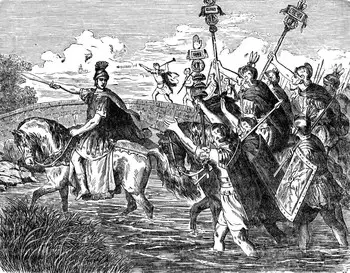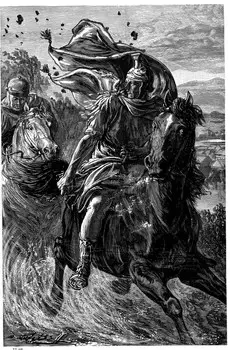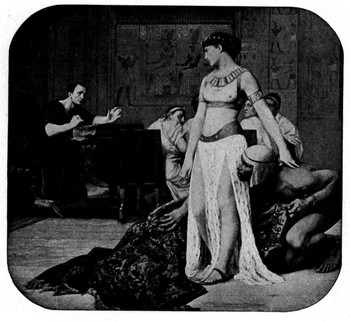The Life of Julius Caesar
|
Share This Page
|
|
|
|
|
|
|
Follow This Site

|
 |
|
|
Part 3: Civil War and Victory
 In 49 B.C., Caesar made the calculated move of bringing his armies across the Rubicon River and into Rome proper. This was against the laws of Rome (which stated that a general could not lead his armies into the home province). As such, it meant civil war. Pompey, whose legions were in Spain, couldn't do much to oppose Caesar at the time and so sailed to the East. Caesar, in the meantime, marched into Rome and had a new Senate installed. This group, which was naturally favorable to him, had him named dictator.
In 49 B.C., Caesar made the calculated move of bringing his armies across the Rubicon River and into Rome proper. This was against the laws of Rome (which stated that a general could not lead his armies into the home province). As such, it meant civil war. Pompey, whose legions were in Spain, couldn't do much to oppose Caesar at the time and so sailed to the East. Caesar, in the meantime, marched into Rome and had a new Senate installed. This group, which was naturally favorable to him, had him named dictator.
Pompey, meanwhile, was in a strong position in Greece. In order to solidify his claim as head of the government, Caesar had to convince Pompey to give up his claims. Pompey wouldn't do it, and so their struggle came to blows.
 The epic struggle took place on the plains of Pharsalus, with Pompey sporting 46,000 men to Caesar's 21,000. Both men were brilliant generals with many victories under their belts by this time. On that day, however, Caesar was the more brilliant, defeating Pompey's forces (although the death toll on both sides was steep). Pompey escaped and fled to Egypt, where he was later betrayed and killed.
The epic struggle took place on the plains of Pharsalus, with Pompey sporting 46,000 men to Caesar's 21,000. Both men were brilliant generals with many victories under their belts by this time. On that day, however, Caesar was the more brilliant, defeating Pompey's forces (although the death toll on both sides was steep). Pompey escaped and fled to Egypt, where he was later betrayed and killed.
After this historic victory, Caesar took the unusual step of pardoning all Roman citizens who were captured. One of those pardoned was Marcus Brutus.
After his success at Pharsalus, Caesar moved to consolidate his position, especially in Egypt. He landed in Alexandria and became involved with Cleopatra, who was in the middle of a power struggle over  the Egyptian throne. The wily queen-to-be had herself wrapped in a rug, a gift for Caesar, and delivered to the dictator. Impressed with her cleverness, Caesar listened to Cleopatra's pleas and agreed to help her. During the ensuing struggle for the throne, a great battle took place in and around Alexandria. Among other things, Caesar ordered the Egyptian fleet burned. In a great blow to history, the Great Library also went up in flames. Finally, in 47 B.C., Cleopatra was named Queen of Egypt, in alliance to Rome.
the Egyptian throne. The wily queen-to-be had herself wrapped in a rug, a gift for Caesar, and delivered to the dictator. Impressed with her cleverness, Caesar listened to Cleopatra's pleas and agreed to help her. During the ensuing struggle for the throne, a great battle took place in and around Alexandria. Among other things, Caesar ordered the Egyptian fleet burned. In a great blow to history, the Great Library also went up in flames. Finally, in 47 B.C., Cleopatra was named Queen of Egypt, in alliance to Rome.
Flush with success in Egypt, Caesar marched on into Asia Minor. On August 1, 47 B.C., he put down a rebellion by a minor king named Pharnaces. Describing this victory, Caesar uttered the words veni, vidi, vici ("I came, I saw, I conquered."). Two months later, he was back in Rome, where new problems awaited him.
Next page > Opponents of Caesar > Page 1, 2, 3, 4, 5